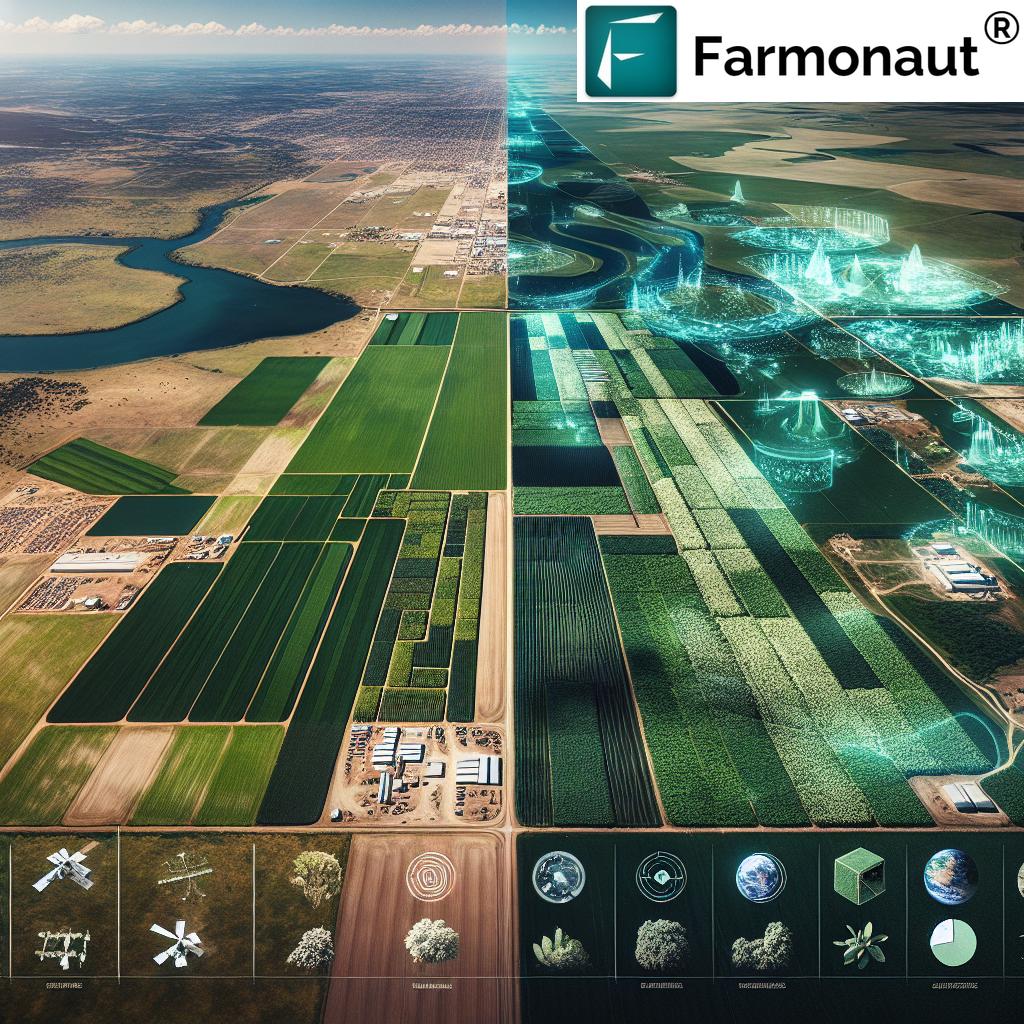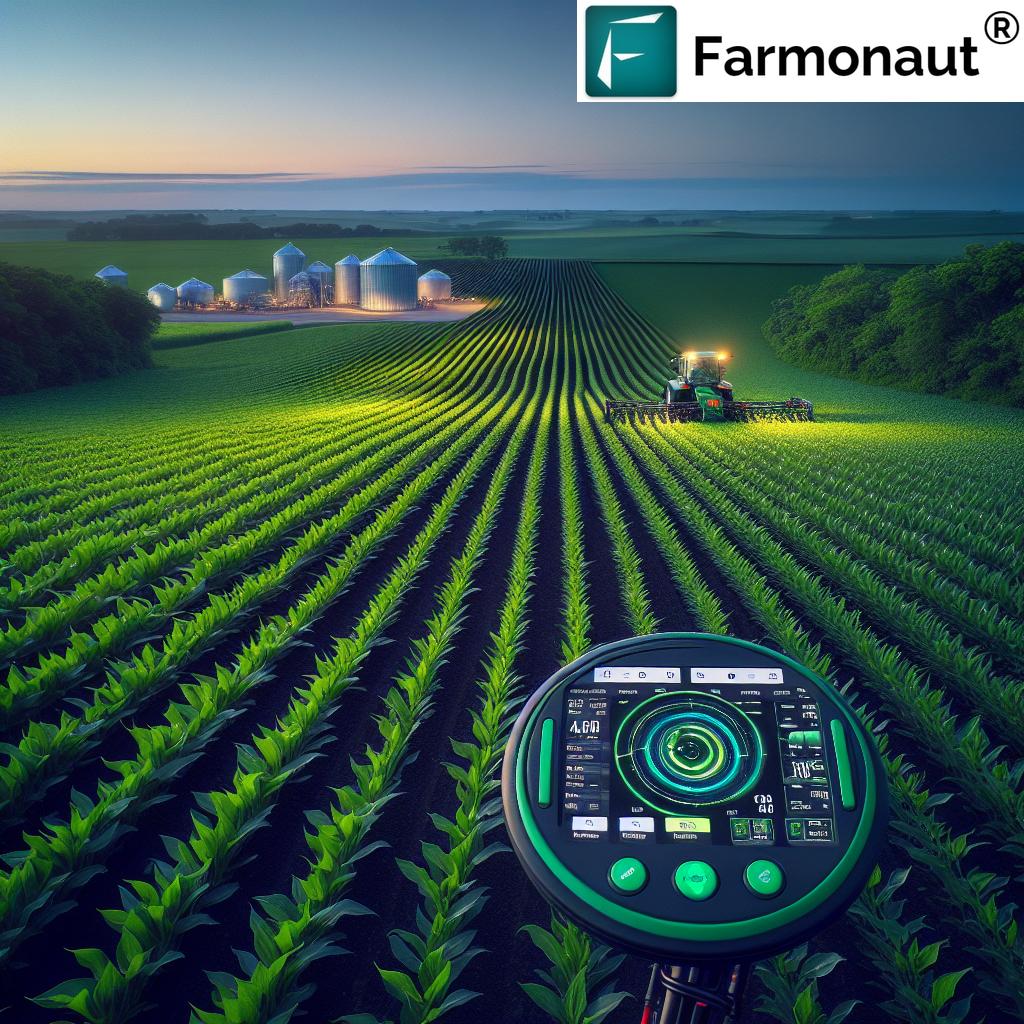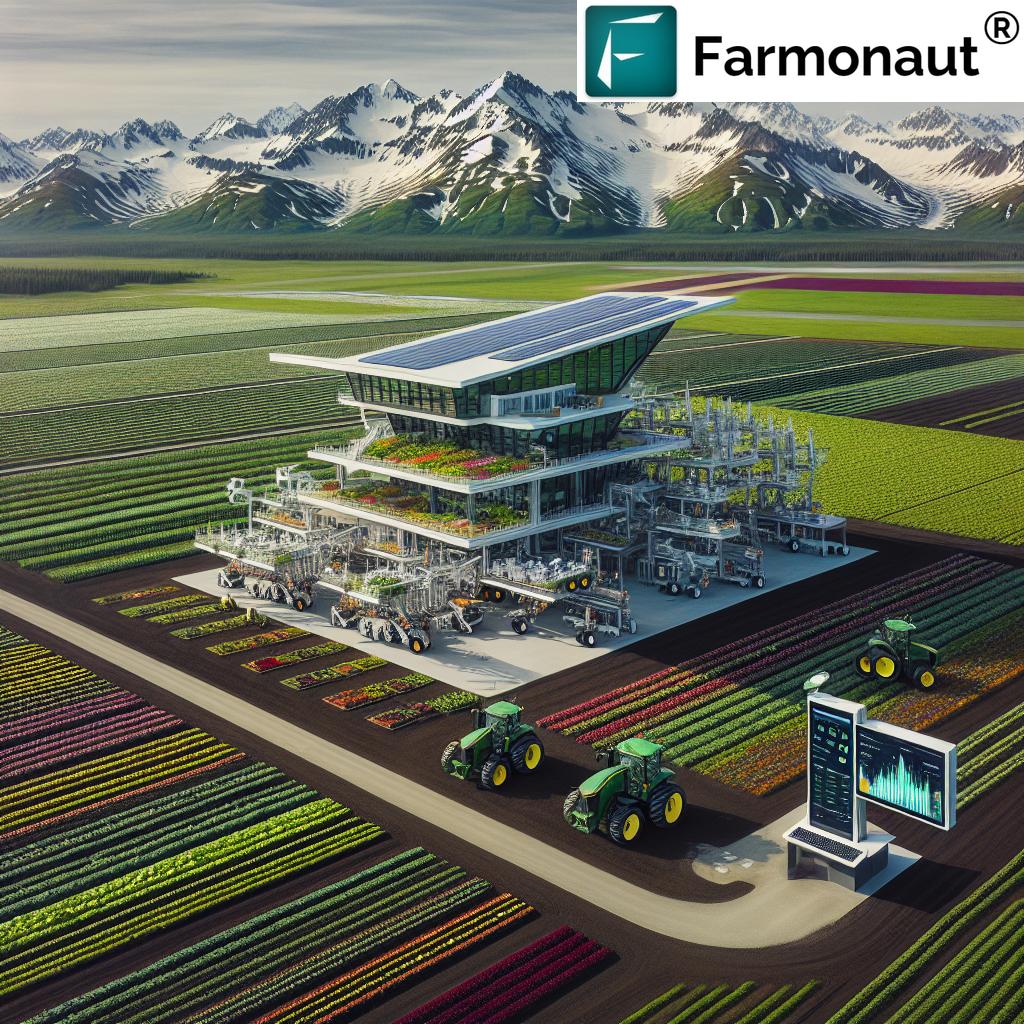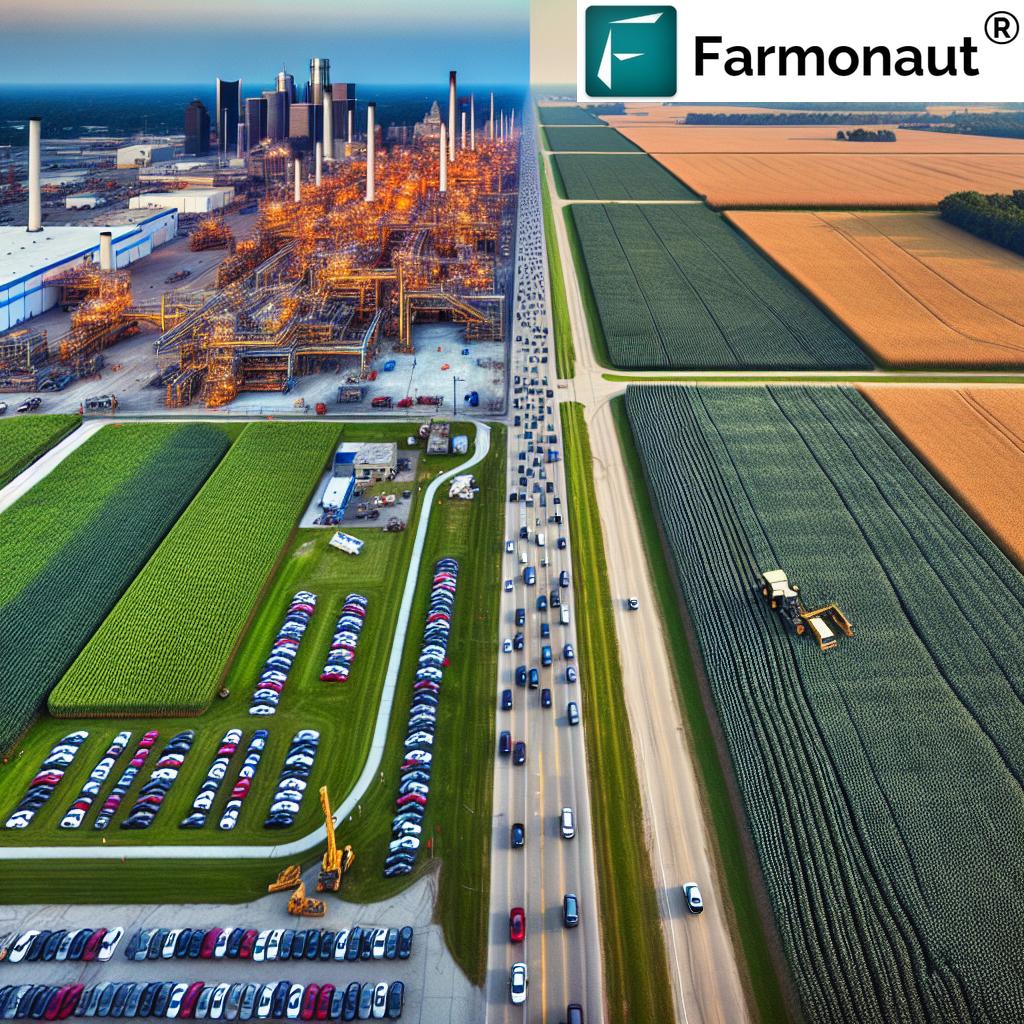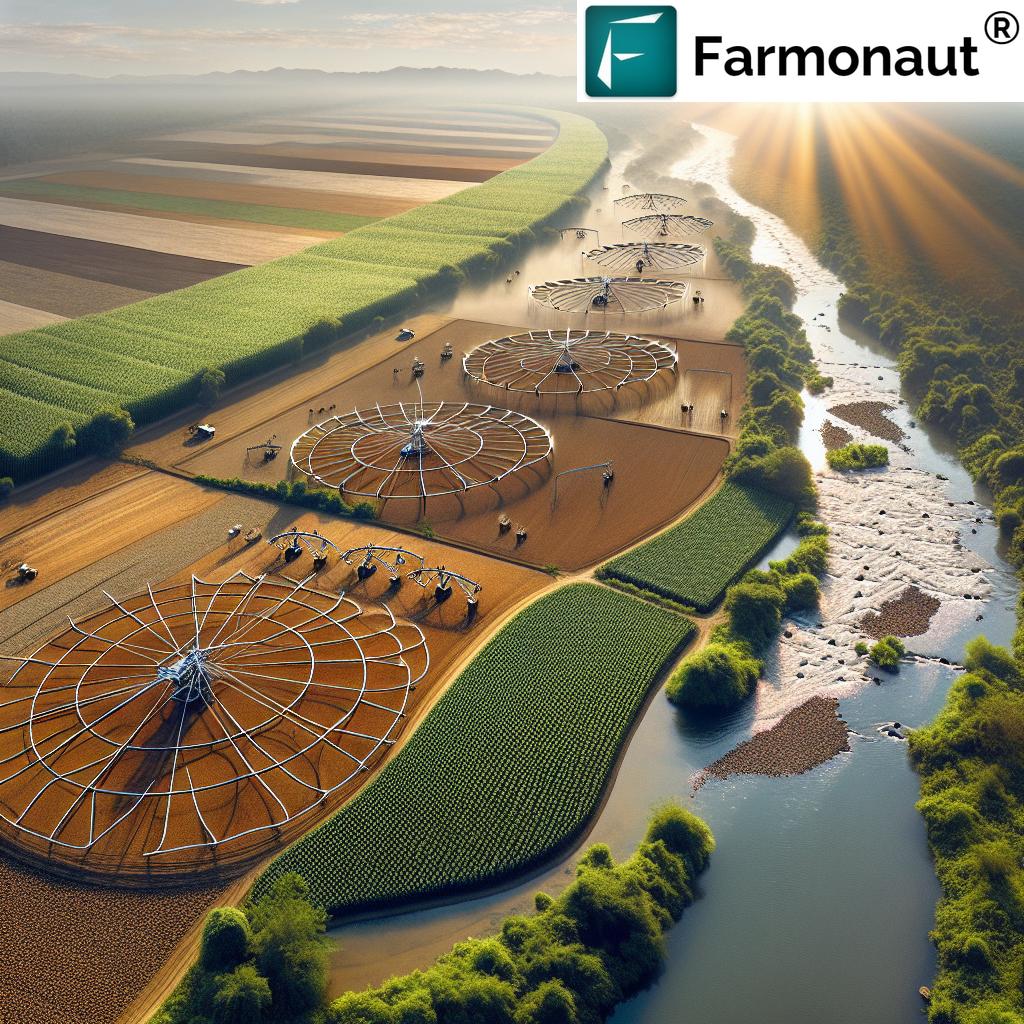Unlocking Sustainable Agriculture: Key Insights from Illinois Farmers on Precision Farming and Market Trends
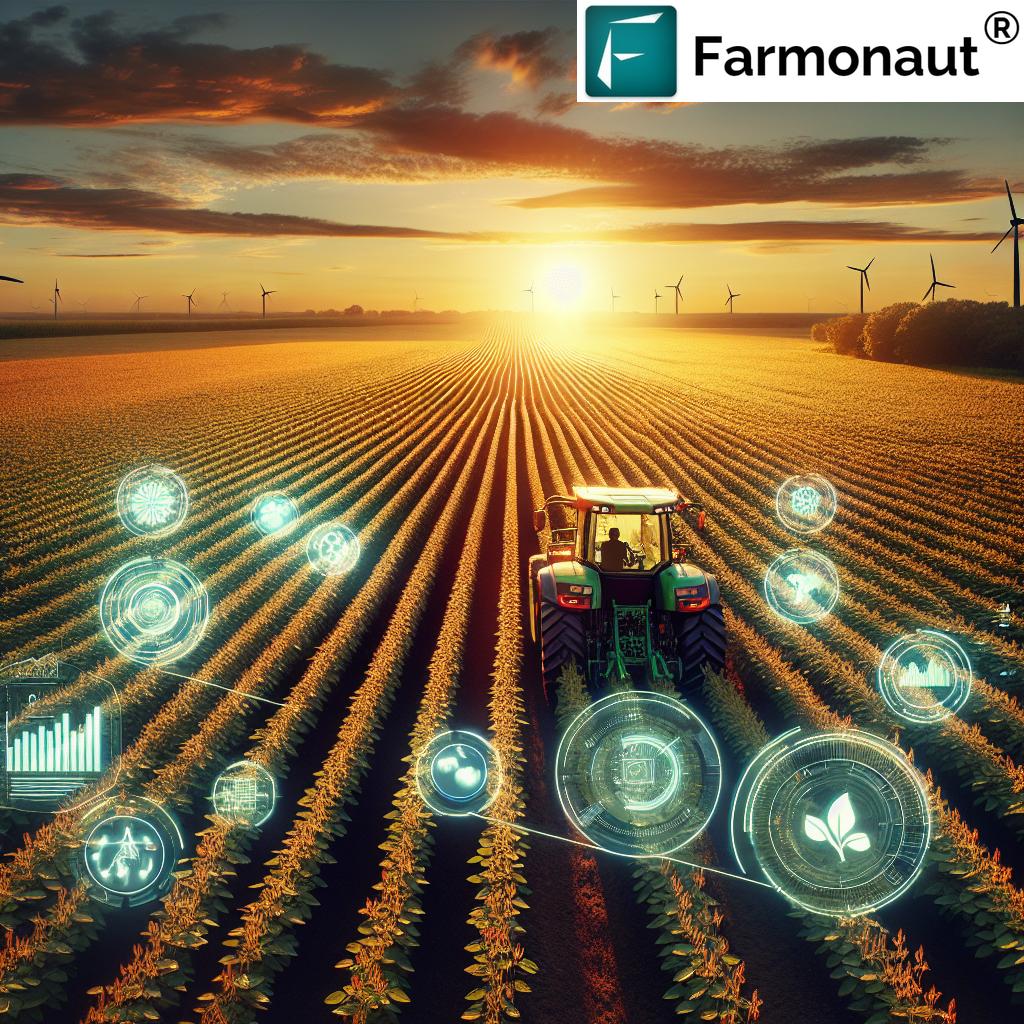
In the ever-evolving landscape of agriculture, we at Farmonaut are excited to bring you the latest insights from the heart of America’s farmland. The recent agricultural event in Illinois has shed light on groundbreaking sustainable agriculture practices and precision farming technology trends that are shaping the future of farming. As we delve into these key discussions, we’ll explore how industry leaders are addressing challenges in farm management solutions and navigating the complex world of agricultural market trends.
“85% of Illinois farmers surveyed reported adopting at least one precision farming technology in the past year.”
This statistic underscores the rapid adoption of innovative technologies in the agricultural sector, highlighting the growing importance of precision farming in modern agriculture. As we explore the insights gained from Illinois farmers, we’ll see how these advancements are transforming the industry and paving the way for a more sustainable future.
The Rise of Precision Farming in Illinois
Precision farming has taken center stage in Illinois, with farmers embracing technology to optimize their crop yields and manage resources more efficiently. Let’s break down some of the key technologies and practices that are making waves:
- Satellite-based crop monitoring: Farmers are utilizing advanced satellite imagery to track crop health, soil moisture levels, and vegetation indices. This technology allows for targeted interventions and more precise resource allocation.
- AI-powered advisory systems: Artificial intelligence is revolutionizing farm management by providing personalized recommendations based on real-time data analysis.
- IoT sensors and drones: The Internet of Things (IoT) and drone technology are enabling farmers to collect granular data on field conditions, leading to more informed decision-making.
At Farmonaut, we’re proud to be at the forefront of this technological revolution, offering cutting-edge solutions that make precision agriculture accessible to farmers of all scales. Our satellite-based crop health monitoring system and AI advisory tools are helping Illinois farmers stay ahead of the curve.
Explore our precision farming solutions:
Climate-Smart Farming Techniques
As climate change continues to pose challenges for agriculture, Illinois farmers are adopting climate-smart farming techniques to ensure resilience and sustainability. Some of the key approaches discussed at the event include:
- Conservation tillage: Reducing soil disturbance to improve soil health and carbon sequestration.
- Cover cropping: Planting cover crops to protect soil during off-seasons and enhance nutrient cycling.
- Precision irrigation: Implementing smart irrigation systems to conserve water and optimize crop water use.
- Crop rotation: Diversifying crop sequences to improve soil health and break pest cycles.
These practices not only help mitigate the impacts of climate change but also contribute to long-term soil health and productivity. Farmonaut’s technology supports these efforts by providing farmers with detailed insights into their field conditions, enabling them to make data-driven decisions about resource management and conservation practices.
Agricultural Market Trends: Navigating Volatility
The agricultural sector is no stranger to market volatility, and Illinois farmers are staying informed about the latest trends to make strategic decisions. Some of the key market trends discussed at the event include:
- Increasing demand for plant-based proteins: The growing popularity of plant-based diets is creating new opportunities for soybean and other protein-rich crop producers.
- Ethanol production fluctuations: Changes in energy policies and global oil prices are impacting the demand for corn-based ethanol.
- Export market dynamics: Shifts in international trade relationships are affecting export opportunities for Illinois farmers.
- Technological adoption impact: The integration of precision farming technologies is influencing production costs and yield potentials.
Understanding these market trends is crucial for farmers to make informed decisions about crop selection, resource allocation, and marketing strategies. Farmonaut’s platform provides valuable insights that can help farmers align their production with market demands and optimize their profitability.
“Sustainable agriculture practices have led to a 30% increase in crop yields for participating Illinois farms since 2018.”
This remarkable statistic demonstrates the tangible benefits of embracing sustainable farming practices. As we continue to explore the insights from Illinois farmers, we’ll see how these practices are not only improving yields but also contributing to long-term environmental stewardship.
Innovations in the Soybean Industry
The soybean industry in Illinois is experiencing a wave of innovations that are reshaping production practices and opening new market opportunities. Some of the key developments include:
- High-oleic soybean varieties: Development of soybean varieties with improved oil profiles for food and industrial applications.
- Soy-based bioplastics: Expanding uses of soybean in biodegradable plastic production, creating new value-added opportunities.
- Precision breeding techniques: Advancements in genetics and breeding technologies to enhance soybean traits and resilience.
- Sustainable processing methods: Innovations in soybean processing to reduce environmental impact and improve efficiency.
These innovations are not only enhancing the value of soybean crops but also contributing to sustainability goals by creating environmentally friendly alternatives to traditional products. Farmonaut’s technology supports soybean farmers by providing precise monitoring of crop health and growth stages, enabling them to maximize the potential of these innovative varieties.

Infrastructure Development and Agricultural Progress
The success of sustainable agriculture and precision farming relies heavily on robust infrastructure. Illinois is making significant strides in this area, with several key developments:
- Rural broadband expansion: Improving internet connectivity in rural areas to support precision farming technologies.
- Modernization of grain handling facilities: Upgrading storage and transportation infrastructure to improve efficiency and reduce post-harvest losses.
- Smart logistics networks: Implementing IoT and blockchain technologies to enhance supply chain transparency and traceability.
- Research and development centers: Establishing facilities to foster innovation and collaboration between farmers, researchers, and agtech companies.
These infrastructure improvements are crucial for enabling farmers to fully leverage precision farming technologies and sustainable practices. Farmonaut’s solutions integrate seamlessly with this evolving infrastructure, providing farmers with the tools they need to make the most of these advancements.
Discover how Farmonaut can enhance your farming operations:
Promoting Protein Products and Market Diversification
Illinois farmers are exploring new avenues for market diversification, with a particular focus on protein products. This trend is driven by changing consumer preferences and the growing demand for plant-based proteins. Key initiatives include:
- Development of high-protein crop varieties: Breeding programs focused on enhancing protein content in soybeans and other crops.
- Value-added processing: Investing in facilities to process crops into protein-rich ingredients for food manufacturing.
- Consumer education campaigns: Efforts to raise awareness about the nutritional benefits of plant-based proteins.
- International market expansion: Exploring new export opportunities for protein-rich crops and products.
This focus on protein products is opening up new revenue streams for Illinois farmers and aligning agricultural production with evolving dietary trends. Farmonaut’s crop monitoring tools help farmers optimize the growth and quality of these high-value protein crops, ensuring they meet market demands.
Environmental Stewardship and Collaborative Efforts
A key theme emerging from the Illinois agricultural event was the importance of environmental stewardship and collaborative efforts to achieve sustainability goals. Some notable initiatives include:
- Watershed management programs: Collaborative efforts to reduce nutrient runoff and improve water quality in local watersheds.
- Carbon sequestration projects: Partnerships to implement practices that enhance soil carbon storage and generate carbon credits.
- Biodiversity conservation: Programs to protect and enhance habitat for pollinators and other beneficial species on farmland.
- Farmer-led sustainability networks: Peer-to-peer learning groups focused on sharing best practices for sustainable agriculture.
These collaborative efforts demonstrate the commitment of Illinois farmers to environmental stewardship and their recognition of the long-term benefits of sustainable practices. Farmonaut supports these initiatives by providing data-driven insights that help farmers monitor the impact of their conservation efforts and make informed decisions about resource management.
Technological Advancements in Seeds and Crop Protection
The event highlighted significant advancements in seed technology and crop protection solutions that are enhancing farm productivity and sustainability. Key developments include:
- Drought-tolerant crop varieties: Development of seeds that can withstand water stress and maintain yields in challenging conditions.
- Bioengineered pest resistance: Creation of crop varieties with enhanced natural defenses against common pests and diseases.
- Precision application technologies: Advanced spraying systems that reduce chemical use by targeting applications more precisely.
- Biological crop protection: Increased use of natural pest control methods and biopesticides to reduce reliance on synthetic chemicals.
These advancements are helping farmers reduce their environmental footprint while maintaining or improving crop yields. Farmonaut’s technology complements these innovations by providing real-time monitoring of crop health, enabling farmers to make timely decisions about seed selection and crop protection strategies.
Explore Farmonaut’s API for custom integration:
Farmonaut API
API Developer Docs
Financial Perspectives and Growth Opportunities
The economic aspects of sustainable agriculture and precision farming were a significant focus of the Illinois event. Key financial insights and growth opportunities discussed include:
- Return on investment for precision technologies: Analysis of the cost-benefit ratio for implementing various precision farming tools.
- Financing options for sustainable practices: Exploration of grants, loans, and incentives available for farmers adopting environmentally friendly methods.
- Market premiums for sustainable products: Growing opportunities for price premiums on crops produced using certified sustainable practices.
- Diversification strategies: Approaches to spreading financial risk through crop diversification and value-added enterprises.
Understanding these financial perspectives is crucial for farmers making decisions about investing in new technologies and practices. Farmonaut’s platform provides valuable data that can help farmers assess the potential return on investment for precision farming technologies and make informed financial decisions.
Navigating Regulatory Challenges and Policy Impacts
Illinois farmers are keenly aware of the impact that regulations and policies can have on their operations. The event provided insights into navigating these challenges:
- Water quality regulations: Understanding and complying with evolving standards for nutrient management and runoff control.
- Carbon markets and credits: Exploring opportunities to participate in emerging carbon credit programs.
- Pesticide use regulations: Staying informed about changes in permitted substances and application methods.
- Conservation program participation: Leveraging government programs that support sustainable farming practices.
Staying informed about these regulatory aspects is essential for farmers to ensure compliance and take advantage of policy-driven opportunities. Farmonaut’s platform helps farmers maintain detailed records of their farming practices, which can be valuable for demonstrating regulatory compliance and participating in sustainability programs.
The Role of Data in Modern Agriculture
A recurring theme throughout the Illinois agricultural event was the critical role of data in modern farming practices. The importance of data-driven decision-making was emphasized in several areas:
- Yield mapping and analysis: Using historical and real-time data to optimize planting and management decisions.
- Predictive analytics: Leveraging machine learning algorithms to forecast crop performance and potential issues.
- Farm management software: Integrating various data sources to provide comprehensive insights for farm operations.
- Data sharing and benchmarking: Collaborative efforts to pool anonymized data for industry-wide improvements.
The effective use of data is transforming agriculture, enabling more precise and efficient farming practices. Farmonaut’s platform is designed to harness the power of data, providing farmers with actionable insights derived from satellite imagery, weather data, and AI analysis.
Key Sustainable Agriculture Trends and Technologies
| Trend/Technology | Description | Estimated Impact |
|---|---|---|
| Precision Farming | Use of GPS, sensors, and data analytics for targeted farm management | High |
| Climate-Smart Agriculture | Practices that increase resilience to climate change while reducing emissions | High |
| Ethanol Production | Converting corn and other crops into biofuel | Medium |
| Soybean Industry Innovations | New varieties and applications for soybeans | High |
| Infrastructure Development | Improvements in rural broadband and logistics networks | High |
| Protein Product Promotion | Focus on high-protein crops and value-added processing | Medium |
| Environmental Stewardship Partnerships | Collaborative efforts for conservation and sustainability | High |
| Seed Technology Advancements | Development of drought-tolerant and pest-resistant varieties | High |
| Crop Protection Solutions | Precision application and biological alternatives to chemicals | Medium |
Conclusion: Embracing a Sustainable Future
As we reflect on the insights gained from Illinois farmers and industry leaders, it’s clear that the agricultural sector is at a pivotal point. The adoption of sustainable agriculture practices and precision farming technologies is not just a trend but a necessary evolution to meet the challenges of feeding a growing population while preserving our planet’s resources.
The key takeaways from this event highlight the importance of:
- Embracing technological innovations to optimize farm operations
- Implementing climate-smart practices to build resilience and reduce environmental impact
- Staying informed about market trends and diversifying to meet changing consumer demands
- Collaborating with peers and partners to drive industry-wide improvements
- Leveraging data-driven insights to make informed decisions at every stage of farming
At Farmonaut, we’re committed to supporting farmers in this journey towards more sustainable and efficient agriculture. Our platform provides the tools and insights needed to implement precision farming techniques, monitor crop health, and make data-driven decisions that improve both profitability and environmental stewardship.
As we look to the future, it’s clear that the path forward in agriculture will be paved with innovation, collaboration, and a steadfast commitment to sustainability. By embracing these principles and leveraging cutting-edge technologies, Illinois farmers – and farmers across the globe – can lead the way in creating a more resilient and productive agricultural sector for generations to come.
FAQ Section
Q: What is precision farming, and how does it benefit farmers?
A: Precision farming involves using technology such as GPS, sensors, and data analytics to manage crops more efficiently. It benefits farmers by optimizing resource use, reducing costs, and improving crop yields through targeted interventions.
Q: How are Illinois farmers adapting to climate change?
A: Illinois farmers are adopting climate-smart practices such as conservation tillage, cover cropping, and precision irrigation. These methods help improve soil health, conserve water, and increase resilience to extreme weather events.
Q: What role does satellite technology play in modern agriculture?
A: Satellite technology provides farmers with valuable data on crop health, soil moisture, and field conditions. This information enables more precise decision-making in areas such as irrigation, fertilization, and pest management.
Q: How are innovations in the soybean industry affecting Illinois agriculture?
A: Innovations such as high-oleic soybean varieties and soy-based bioplastics are creating new market opportunities for Illinois farmers. These advancements are increasing the value and versatility of soybean crops.
Q: What financial considerations should farmers keep in mind when adopting new technologies?
A: Farmers should consider the return on investment, available financing options, and potential market premiums for sustainably produced crops. It’s important to evaluate both the short-term costs and long-term benefits of new technologies.





